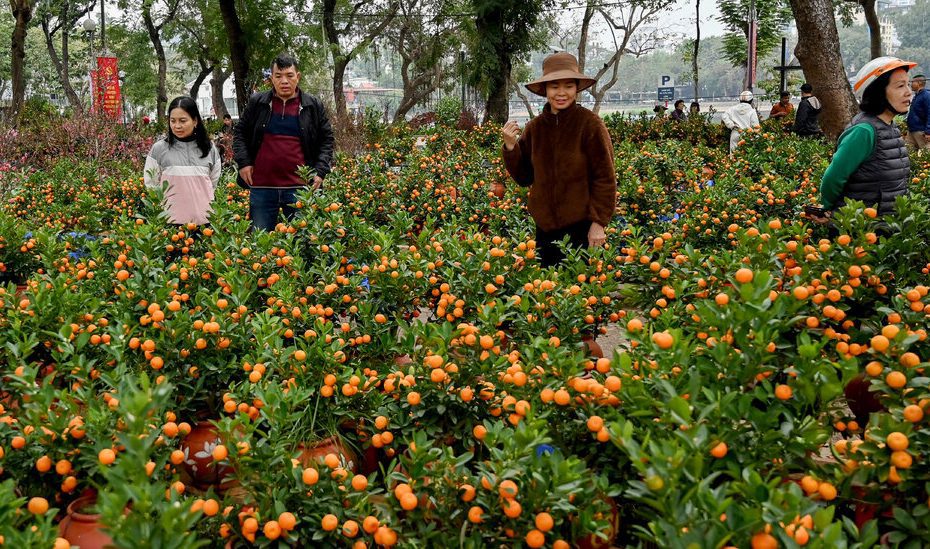In Hanoi and other Vietnamese cities at this time of the year, kumquat trees avoided engine chairs that avoid and weave through traffic in a haze of Orange. They buy families as symbols of happiness and happiness for the new New Year, which started on Wednesday.
This year a typhoon and extreme heat dent the harvest, clambering prices for kumquats and other ornamental plants associated with the holiday, known as TET in Vietnam. Some people bought smaller kumquats or switched to cheaper options, such as orchids or press partners.
Ornamental plant farmers are now attached to unsold inventory after months of price fluctuations on the market. In the case of Kumquats, wholesale prices initially increased due to a limited offer. They then received a lack of demand linked to consumer anniversary and a perception that the Golf-Ball-size Kumquat fruits of this year do not look very nice.
“We are all in a sad mood,” said Nguyen Thi Hoa, 39, who grows Kumquat trees near Hanoi's Red River, about the ornamental plant farmers in her corner of the capital. Unsubsident Kumquat trees stood next to her, each sold for around 600,000 Vietnamese Dong, or $ 24. That is at least 40 percent less than in a typical year.
It would be difficult to overestimate how important the new New Year is for Vietnamese people – imagine that Christmas and Thanksgiving are combined – or how ubiquitous Kumquat trees are in Vietnam and parts of the neighboring China when the holiday approaches. The Squat citrus plants are a regular presence in living rooms, shops and office lobbies.
In September, Typhoon Yagi flooded agricultural land and damaged crops in North Vietnam during a critical growth period for kumquats and other decorative patches from Lunar New Year. Mrs. Hoa said that floods from the storm killed about half of the 500 kumquat trees that she had planted.
Higher than average temperatures and a shortage of rainfall last year also harm the harvest, said Pham Thi Thanh NGA, the director of the Vietnam's Institute of Meteorology, Hydrology and Climate Change.
The extreme weather translated into steep price fluctuations in the markets and sidewalk stalls where people buy Lunar New Year Kumquats, Peach Blossoms and bananas. The lack of rain also made Kumquat -trees weaker and their fruit less attractive, say farmers.
“This tree is much less beautiful than I expected,” said Nguyen Thi Nguyet, 39, while this week she inspected a pot of Kumquat in a lunar year market in Hanoi. The fruits looked smaller and thinner than normal.
The tree still cost the equivalent of around $ 80, or double its budget. So Mrs. Nguyet, who works in the education department in Hanoi, paid around $ 13 for a bouquet of Orchids imported from China.
Nguyen Thi Loan, a retired teacher, was stunned to see the price on a couple of 21 green bananas on a plastic sail: about $ 28. She usually pays a little more than $ 1.
“These are the most expensive bananas I have ever touched in my life,” said Mrs. Loan, 64, while flowers and pork sausages poked out of her shopping bag. Bananas, the go-to fruit for placing family altars to honor ancestors, are usually the cheapest item to buy for the holidays, but this year they are more expensive than meat, she added.
“It's unheard of,” she said. “It's crazy!”
The banana seller, Tran van Huy, 50, did not admit the price. So Mrs. Loan bought a forest instead of the three she had planned. She said that this year she would add other fruit to the family altar.
The price sensitivity to ornamental plants is partly a function of general economic malaise in Vietnam, NGO Tri Long, a retired officer of the Ministry of Finance, told the VNEXPRESS news site this week. Although Vietnam's economy grew by around 7 percent last year, Mr. Long said that it had not been fully recovered from the pandemic and natural disasters.
Consumers can adapt to a volatile market for kumquats and other decorative lists by changing what they buy, but farmers still have to do with the effects.
A Kumquat farmer on the outskirts of Hanoi, Nguyen Duc Vinh, said he had lost 40 percent of 3,000 trees on floods and strong wind of Typhoon Yagi. That was especially painful because it happened in a time of year in which wholesalers start inspecting Kumquat farms and giving orders for Lunar New Year.
When the holiday approached, Mr Vinh, 51, raised his wholesaler Kumquat prices by around 50 percent to cover his labor costs, he said. But traders do not bite, so he reduced them to the normal price of around $ 10.
“This vessel has become more precarious than ever,” he said.
Nguyen van Loi, a Kumquat seller in Hanoi who bought 1,000 trees from Mr Vinh, said on Monday that he still had around 400 left to sell, even after he had lowered the price by half.
“One of the worst years in my 10 years,” said Mr. Loi, 44, while his wife gave Kumquat -trees water to keep them fresh.
A few stopped on an engine to check the tree trunks and then drove away without buying anything.
Judson Jones contributed reporting.

